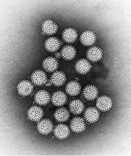Rotavirus vaccines show promise in US but questions remain for rest of world
March - April, 2009 | Volume 8, Issue 2

Photo by Charles D.
Humphrey, CDC
Negative-Stain Electron
Micrograph of Rotavirus A.
Two new vaccines against rotavirus are working well without dangerous side effects in the United States, but guidelines for their use may impair full effectiveness in developing countries, according to a New England Journal of Medicine article co-authored by Fogarty Director Dr. Roger I. Glass.
The vaccines, RotaTeq and Rotarix, have not been shown to be involved with the potentially fatal intestinal condition in infants that led to the first vaccine, RotaShield, being removed from the market in 1999.
Glass and co-author Umesh D. Parashar said the nearly 70 percent drop in U.S. disease activity in 2008, two years after the two vaccines went on the market, is larger than was expected. They suggest the reason could be "herd immunity," or the absence of rotavirus in older children who were not vaccinated.
Because of problems with RotaShield, current guidelines recommend that the newer products not be given after 14 weeks of age. As a result, there is "the potential to result in major reductions in vaccine coverage in developing countries, where delays in the timing of vaccination are common and exact age is not accurately recorded," the article said.
The virus kills half a million children worldwide each year; relatively few in the United States. But Glass and Parashar caution that the vaccines may not be as effective in developing countries, where the need is greatest, because of environmental conditions and the use and timing of other medications.
Glass was recently quoted in Stanford Medicine about the work being done by former colleague and former Fogarty grantee Dr. Harry Greenberg to help India develop its own rotavirus vaccine, which could be produced and distributed more cheaply than if it were imported.
Read the full article, Insourced to India, from Stanford Medicine.
"Rotavirus vaccines—early success, remaining questions." Umesh D. Parashar and Roger I. Glass. N Engl J Med. 2009 Mar 12;360(11):1063-5.
To view Adobe PDF files,
download current, free accessible plug-ins from Adobe's website.